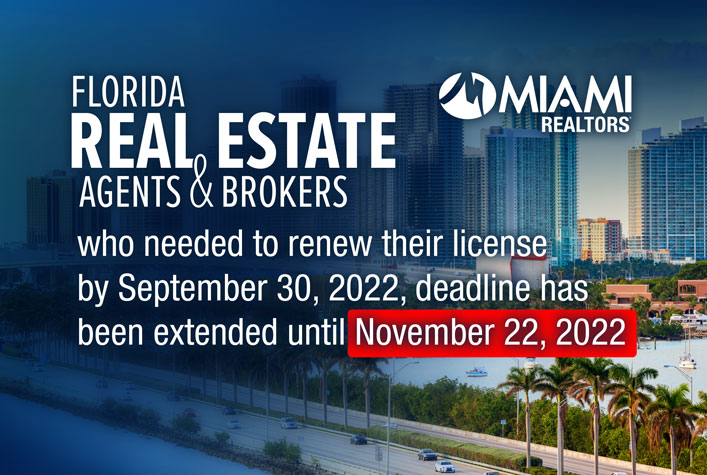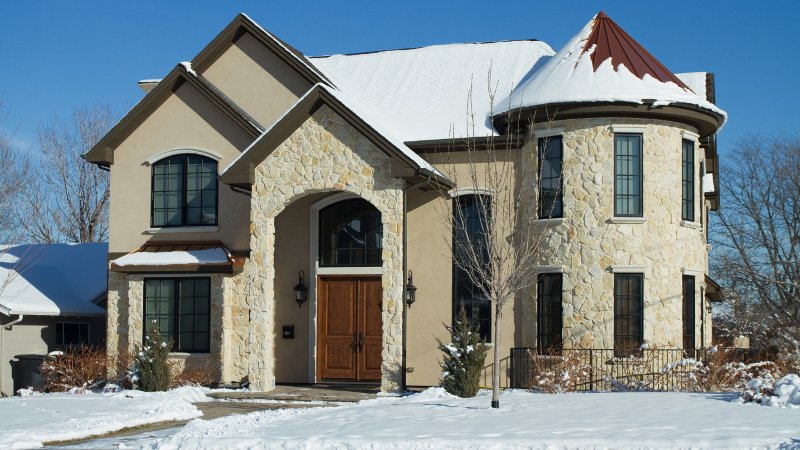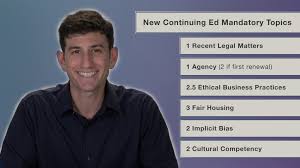
The most important question you should ask yourself when considering Florida's real estate licensing is "What education do I need?" This article will outline the requirements for pre-licensing education, how long it takes, and how to make the most of that education. We'll also discuss which courses are the most important, and what you should expect to pay as a result.
Pre-licensing Education
You need to take some pre-licensing classes before you can legally practice real estate. Before you can apply for a licence, you need to have completed at minimum 63 hours of prelicensing instruction. The courses should cover mathematics, law principles, and real estate practice. Some courses can cost between $100 and $500. To be licensed in Florida you need to have a 70% passing score. Attorneys don't need to take pre-licensing classes. They can sit for the exam as a sales associate without a license.

Pre-licensing education for real property in Florida can be obtained online or in person through a number of companies. Many of these courses offer self-paced learning and practice exams. Others provide a variety study aids including textbooks and practice tests. No matter which option you choose, make sure that you complete the pre-licensing education requirements of your state. Fortunately, there are some online programs that are free and offer pre-licensing education.
Cost of prelicensing school
The cost of prelicensing education to become a real estate agent can vary depending on the state. There are many factors that can explain this. The most common reason is the time and effort required to create real estate courses. These courses are produced by companies that must pay their employees to keep them up-to-date and comply with state laws. While some title companies and brokerages offer continuing education courses for free, they are usually not free as they are longer and more detailed than other courses.
No matter what state you are from, Florida real estate licensing education is well-worth the expense. A Florida realty exam contains 100 multiple-choice items and a passing mark of 75%. There are 45 questions about real estate law and principles, as well as 10 questions to test your mathematical skills. You can expect to score 75% or more if you study well.
Pre-licensing education takes time
To obtain a Florida real-estate license, one must be 18 years old and pass a background screening. They must complete at minimum 90 hours of prelicensing education. They must have a good moral character and must disclose any criminal convictions. If they are convicted of any felony, they won't be considered for a licensed real estate agent. Fingerprint clearance is required. After that, they will need to be approved online by their Broker and complete their continuing education requirements.

The applicant must be at the least 18 years of age and have a United States social security number. In addition to this, applicants must have a high school diploma. Real estate education is not necessary in Florida. However, having the right foundation can help you learn the ropes. A few states are recognized by Florida, including Arkansas, Georgia and Illinois. Florida allows applicants to apply for licenses if they hold a realty license from one of the above states. Candidates from Arkansas, Georgia and Illinois must also pass a state exam.
FAQ
How many times do I have to refinance my loan?
It all depends on whether your mortgage broker or another lender is involved in the refinance. In both cases, you can usually refinance every five years.
How much will my home cost?
This can vary greatly depending on many factors like the condition of your house and how long it's been on the market. Zillow.com says that the average selling cost for a US house is $203,000 This
Can I get a second mortgage?
Yes. However it is best to seek the advice of a professional to determine if you should apply. A second mortgage can be used to consolidate debts or for home improvements.
Statistics
- The FHA sets its desirable debt-to-income ratio at 43%. (fortunebuilders.com)
- Over the past year, mortgage rates have hovered between 3.9 and 4.5 percent—a less significant increase. (fortunebuilders.com)
- Based on your credit scores and other financial details, your lender offers you a 3.5% interest rate on loan. (investopedia.com)
- Some experts hypothesize that rates will hit five percent by the second half of 2018, but there has been no official confirmation one way or the other. (fortunebuilders.com)
- Private mortgage insurance may be required for conventional loans when the borrower puts less than 20% down.4 FHA loans are mortgage loans issued by private lenders and backed by the federal government. (investopedia.com)
External Links
How To
How to Purchase a Mobile Home
Mobile homes are homes built on wheels that can be towed behind vehicles. They were first used by soldiers after they lost their homes during World War II. People who live far from the city can also use mobile homes. Mobile homes come in many styles and sizes. Some are small, while others are large enough to hold several families. There are some even made just for pets.
There are two types of mobile homes. The first is made in factories, where workers build them one by one. This is done before the product is delivered to the customer. Another option is to build your own mobile home yourself. First, you'll need to determine the size you would like and whether it should have electricity, plumbing or a stove. You will need to make sure you have the right materials for building the house. Finally, you'll need to get permits to build your new home.
If you plan to purchase a mobile home, there are three things you should keep in mind. A larger model with more floor space is better for those who don't have garage access. A larger living space is a good option if you plan to move in to your home immediately. You'll also want to inspect the trailer. Damaged frames can cause problems in the future.
You need to determine your financial capabilities before purchasing a mobile residence. It is important to compare prices across different models and manufacturers. Also, consider the condition the trailers. There are many financing options available from dealerships, but interest rates can vary depending on who you ask.
Instead of purchasing a mobile home, you can rent one. You can test drive a particular model by renting it instead of buying one. Renting isn’t cheap. Renters usually pay about $300 per month.